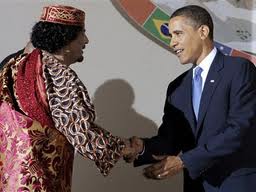Gaddafi The Big Loser – OpEd
By Press TV
By Mohyeddin Sajedi
Muammar Gaddafi is an obvious example of a defeated leader, who along with himself, ruined his nation; within less than one month engaged his country in a war and exposed Libya’s key economic and military infrastructures to the European governments’ invasion.
It should be confessed that Gaddafi was successful in two things: Firstly, he turned the popular revolution in his country into an armed rebellion, so that he could crush it through military means; an objective that the Yemeni and Bahraini dictators could not achieve and the Tunisian and Egyptian dictators missed the opportunity to do so.

Secondly, through letting foreigners into his country, he managed to make himself seem like a victim of foreign conspiracies with the hope of winning public opinion support partly within his nation and across the region, particularly considering the fact that he has had a long record of populist rhetoric and actions and has always introduced himself as a defender of the rights of colonized nations. Nevertheless, such achievements are not that much of benefit to the Libyan dictator, as the world has made its decision. Even if he can resist, he will not see anything more than the destruction and isolation of Libya.
Now the main question remains: Are world powers able to resort to a heavy military assault to change a regime, just through a UN Security Council resolution? The pattern that the US and the West are now following to force Gaddafi to withdraw is to a great extent similar to the NATO invasion of Serbia for resolving the Kosovo issue. The difference is that Libya is too large to be tackled just through air and missile strikes.
Enforcement of a no-fly zone did not lead to the ouster of former Iraqi dictator Saddam Hussein and he was toppled only after ground military intervention by the US and its allies. Moreover, heavy missile attacks could not defeat Taliban and al-Qaeda in Afghanistan and still more than half of the country is out of the control of the central government.
From the military point of view, the air force enters operations to help prepare the grounds for tanks and a ground invasion. It so seems that the experience of Iraq and Afghanistan will not let the leadership in the US and Europe to think of dispatching army forces to Libya, particularly considering the fact that the lingering of land operations may change the conditions to Gaddafi’s benefit and turn him into an anti-colonial champion.
Besides Libyan air bases, US and British missiles and French warplanes target the line of Libyan troops and pro-Gaddafi militants around Benghazi. Therefore, Libya may in fact divide into two western and eastern parts until a solution would be found for convincing Gaddafi to leave power. Benghazi has turned into the symbol for defeat or the victory of Gaddafi’s opponents. When the people of the city celebrate after hearing the news of the passage of 1973 UNSC resolution or the West’s missile strike, it is a clear indication of the collapse of Gaddafi’s 42-year rule.
It seems that nobody, except Gaddafi, wants the war to prolong, without a guarantee for an immediate end to it. By invading Libya, Western governments try to cleanse themselves from their previous failings in supporting the Arab world dictators, however they know that engaging in a long-term erosive war will gradually change their nations’ minds, especially when the African nations still have a lot of memories from Europe’s colonial era.
At the Paris summit, held for declaring war against Libya, no prominent African leader was present. Gaddafi wants to engage in a long-term war by setting up strongholds in towns and deserts. He deems the whole Mediterranean Sea as the battlefield and cautions the West against lifting the barrier and letting illegal immigrants into southern Europe and getting close to al-Qaeda.
Meanwhile, the most important factor is the Libyan people. Like Saddam Hussein, Gaddafi does not have a massive popular base in his country and, through an ideological view, he deems himself as an advocate of a worn-out cause which is not compatible with the realities of the contemporary Arab world. Relying on Arab nationalism was only effective 40-50 years ago, when the West and the East blocks had divided the world based on their ideologies.
A glimpse at Yemen shows that the unity of the people has marginalized the ideological slogans which are aimed at the disintegration of the country. Before the people’s uprising against President Ali Abdullah Saleh, the separatist groups in southern Yemen had found proper opportunities for expressing their demands. Elsewhere in Bahrain, the opponents of the country’s dictator king avoid any ideological slogan or demand in order to protect national unity.
The Western governments delayed the invasion of Libya, until the time it became an international demand. The invasion of Libya is contingent upon the UN Security Council. The abstention votes by Russia and China and the statements made by some of the European, African and Asian leaders question the idea that there was an international consensus for attacking Libya. If this invasion achieves its ideal results, worries are surfacing about the repeat of such actions in Syria and other countries in the Middle East.
